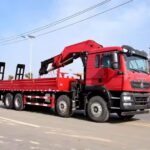When it comes to recovering vehicles involved in accidents, mishaps, or challenging recovery situations, one piece of heavy machinery stands out as the ultimate solution: в rotator tow truck. These impressive vehicles have revolutionized the towing and recovery industry, offering unmatched versatility, power, and precision. У цій статті, we will delve into the world of rotator tow trucks and explore why they are considered the ultimate solution for complex recoveries.
The Evolution of Towing and Recovery
The towing and recovery industry has come a long way since its inception. Early methods involved simple ropes, chains, and brute force to move disabled or damaged vehicles. As the automotive industry advanced and vehicles became larger and more complex, so did the need for specialized equipment to handle these challenges.
Traditional tow truckс, with their straightforward design and functionality, were sufficient for many years. Проте, as technology advanced and vehicles became increasingly intricate, the limitations of traditional евакуаторs became apparent. The industry needed a new solution to tackle complex recoveries efficiently and safely.
Enter the Rotator Tow Truck
The rotator tow truck, also known as a rotator wrecker or a rotator recovery truck, represents the pinnacle of towing and recovery technology. These impressive machines are equipped with a rotating crane that can swivel a full 360 ступенів, making them exceptionally versatile in recovering vehicles in various situations.

Key Features of Rotator Tow Trucks:
1. Enhanced Lifting Capacity:
Rotator tow trucks boast significantly higher lifting capacities than traditional tow truckс. Some of the most powerful rotators can lift to 75 tons or more. This immense strength allows them to handle even the heaviest of vehicles, including tractor-trailers, автобуси, та будівельне обладнання.
2. Precise Control:
The rotating crane on a rotator tow truck provides operators with precise control over the recovery process. The ability to rotate and extend the crane with accuracy ensures that the vehicle can be lifted and positioned precisely where it needs to be, minimizing the risk of further damage during recovery.
3. Versatility:
One of the standout features of rotator tow trucks is their incredible versatility. They can perform a wide range of tasks, including uprighting overturned vehicles, recovering vehicles from precarious positions, and even winching vehicles from water bodies. Their adaptability makes them invaluable in complex recovery scenarios.
4. Improved Safety:
Rotator tow trucks are designed with safety in mind. The precise control they offer reduces the risk of accidents during the recovery process. Operators can carefully manipulate the crane to prevent additional damage to the vehicle or surrounding structures, ensuring the safety of everyone involved.
5. Faster Recovery Times:
The efficiency and power of rotator tow trucks translate into faster recovery times. This can be crucial in situations where traffic needs to be quickly cleared or when there is a risk of environmental damage, such as a vehicle leaking hazardous materials.

Applications of Rotator Tow Trucks
Rotator tow trucks have a wide range of applications, making them indispensable in various industries and scenarios. Some of the key uses include:
1. Heavy-Duty Recovery:
Rotator tow trucks excel at recovering large, heavy vehicles. Whether it’s a semi-truck that has jackknifed on the highway or a construction vehicle stuck in a precarious position, rotators can handle the job with ease.
2. Industrial and Construction Sites:
Construction sites often require specialized recovery equipment due to the size and weight of machinery used. Rotator tow trucks are a common sight on construction sites, ready to assist in moving or recovering heavy equipment.
3. Emergency Response:
In emergencies, such as accidents involving hazardous materials or vehicles submerged in water, rotator tow trucks can play a vital role in ensuring a swift and safe response.
4. Environmental Cleanup:
Rotator tow trucks equipped with environmental recovery systems are used to mitigate the impact of accidents involving hazardous materials. These trucks can contain spills and prevent environmental damage quickly.

The Human Touch: Skilled Operators
While rotator tow trucks are undeniably powerful and versatile machines, their effectiveness also depends on the skill and expertise of the operators. Operating a rotator tow truck requires extensive training and experience. Skilled operators understand the nuances of vehicle recovery, including weight distribution, the center of gravity, and the best angles for lifting and maneuvering.
Safety is paramount in the towing and recovery industry, and experienced operators know how to prioritize it while efficiently completing complex recoveries. They are also adept at assessing the unique challenges presented by each recovery situation and devising the best strategy to tackle them.
The Future of Towing and Recovery
As technology continues to advance, so too will the capabilities of rotator tow truckс. Innovations in materials, гідравліка, and control systems will likely lead to even more powerful and efficient machines in the future. These advancements will further solidify rotator tow trucks as the ultimate solution for complex recoveries.
Moreover, the towing and recovery industry will likely see increased integration with digital technologies. This could include real-time monitoring, remote operation capabilities, and enhanced safety features. These innovations will not only improve the efficiency of recovery operations but also enhance the safety of operators and the public.

Висновок
Rotator tow trucks have revolutionized the towing and recovery industry, offering unmatched versatility, power, and precision in handling complex recovery situations. Their ability to lift and maneuver heavy vehicles with precision, along with their versatility in various scenarios, makes them the ultimate solution for challenging recoveries. As the industry continues to evolve, rotator tow trucks will play a central role in ensuring the safety of motorists and the efficiency of recovery operations. In the hands of skilled operators, these remarkable machines will continue to make our roads safer and our recovery efforts more effective.









